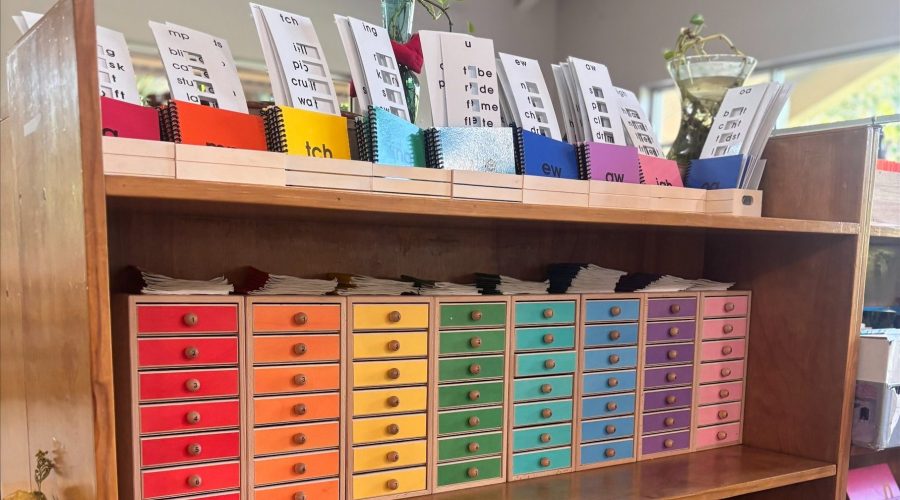Nurturing the Return to Learning: Supporting Your Child’s Montessori Journey
As our Montessori community settles into the beautiful rhythm of a new school year, we’re witnessing the gentle magic of children reconnecting with their classroom environments and rediscovering their love of learning. These first weeks are precious—a time when children remember the joy of purposeful work, the comfort of familiar routines, and the sense of belonging in a community that honors their individuality.
We embrace each child’s natural rhythm while gently supporting their return to the flow of daily classroom life. Dr. Maria Montessori observed that children thrive when given a structured environment that supports independence, curiosity, and self-discipline. Furthermore, as your child settles back into school routines, this is a perfect time to strengthen the bridge between home and school. This approach will ensure consistency in the values and rhythms they experience in both places.
THE MONTESSORI APPROACH TO TRANSITIONS
Recognizing that transitions, whether at the start of the school year or after a break, are best supported through predictable rhythms, not rigid schedules is key. A child who knows what comes next can prepare themselves mentally and emotionally. As a result, this preparedness will lead to greater independence and confidence.
Additionally, it’s important to understand that every stage of development, from toddlerhood to adolescence, has its own unique needs, as described in Montessori’s Planes of Development. Below are age-appropriate ways you can support your child at home as they reconnect with their learning rhythm.
TODDLERS (AGES 16 MONTHS – 3 YEARS): SUPPORTING THE RETURN TO CLASSROOM COMMUNITY
During the first plane of development, toddlers are in the period Montessori called the Absorbent Mind. In this plane they learn effortlessly through their senses and imitation. As they readjust to the classroom environment, you may notice them bringing home new skills and behaviors. Here’s how to nurture this growth:
Morning Grace and Courtesy: Reinforce the grace and courtesy lessons they practice at school—saying “please” and “thank you,” waiting for their turn, and caring for their environment. Therefore, invite your toddler to help prepare their own breakfast by spreading butter, pouring water, or arranging fruit. These are not just chores—they are purposeful activities that build coordination, independence, and self-esteem.
Purposeful Movement and Exploration: Provide opportunities for focused, hands-on activity at home. Specifically, low shelves with rotating activities such as wooden puzzles, nesting cups, or sorting baskets mirror the prepared environment at school, encouraging concentration and decision-making.
Natural Rhythm of Rest: Honor their natural sleep patterns while building gentle consistency. For instance, a calm rest space with soft lighting, natural fabrics, and quiet background sounds will help them transition smoothly between active and quiet times.
Connection to Nature: Daily outdoor time—whether exploring the backyard or walking in a park—supports gross motor development, sensory integration, and a sense of wonder about the world.
EARLY CHILDHOOD (AGES 3 – 6 YEARS): CULTIVATING INDEPENDENCE AND JOY IN LEARNING
At this stage, children continue in the Absorbent Mind phase but with increasing reasoning skills. They are refining coordination, language, and social abilities while engaging in deep, uninterrupted work.
Morning Work Cycle Preparation: Create a morning routine that mirrors the classroom’s three-hour work cycle. Allow your child to choose clothing, prepare simple foods, and organize belongings—fostering decision-making and responsibility.
Practical Life at Home: Encourage meaningful household tasks like folding laundry, watering plants, or preparing snacks. These activities strengthen fine motor skills, concentration, and the understanding that they are contributing members of the family community.
Language-Rich Environment: Storytelling, poetry recitation, and meaningful conversations all enrich vocabulary and communication skills. Moreover, nature journals—where children can draw and describe observations—connect home life with the scientific and cultural explorations of the classroom.
Mathematical Thinking in Daily Life: Bring math into everyday moments like counting steps, measuring ingredients, or grouping objects by size and shape. Montessori materials build abstract thinking from concrete experiences, and similarly, these home activities provide the same foundation.
Cultural Awareness and Celebration: Introduce foods, music, and traditions from different cultures. This aligns beautifully with Montessori’s cosmic education, where children learn to see themselves as part of a diverse and interconnected world.
ELEMENTARY (AGES 6 – 12 YEARS): FOSTERING COSMIC EDUCATION AND INDEPENDENT RESEARCH
Moving into the second plane of development, children become reasoning explorers, eager to understand how and why the world works. Their imagination, moral sense, and ability to think abstractly expand dramatically.
Reflection and Goal Setting: Begin each day with quiet time. Next, invite your child to set goals, review questions they want to explore, or share gratitude. This nurtures self-awareness and personal responsibility—core elements of Montessori elementary work.
Independent Research Time: Provide access to books, maps, art supplies, and digital resources for self-chosen projects. In Montessori classrooms, research grows from genuine curiosity, and consequently, supporting this at home deepens engagement.
Community Contribution and Service: Encourage meaningful contributions—caring for younger siblings, helping with family decisions, or joining local service projects. Montessori called this developing a “sense of cosmic responsibility.”
Time and Task Management: Additionally, help your child design personal schedules balancing academic work, creative projects, exercise, and rest. Planning tools and self-reflection build executive function skills they will use for life.
Collaborative Learning: Furthermore, invite them to share their knowledge by teaching siblings, leading family discussions, or creating presentations. This reflects the multi-age, peer-learning environment of the Montessori classroom.
CREATING HARMONY BETWEEN HOME AND SCHOOL
When home and school environments work in harmony, children experience consistency and security that allows them to thrive. Here are a few guiding principles:
● Establish Consistent Sleep Rhythms: Align home routines with school schedules to ensure deep, restorative rest.
● Practice Grace and Courtesy: Model respectful communication, active listening, and care for shared spaces.
● Embrace Mistakes as Learning: Frame challenges as opportunities for growth, fostering resilience and joy in learning.
● Prepare the Environment: Offer organized, beautiful spaces for work, reading, and creativity—mirroring the order of the classroom.
A GENTLE BEGINNING
Transitions take time, and each child adjusts at their own pace. Some rejoin the classroom rhythm effortlessly, while others need a gradual return. However, by honoring your child’s individuality while providing consistent, loving boundaries, you set the stage for a joyful and productive school year.
We are honored to partner with you in guiding your child’s journey. Together, we cultivate the independence, curiosity, and sense of responsibility that prepare them not just for academic success, but for a lifetime of thoughtful engagement with their world.
The rhythm of the school year has begun once again, and we are privileged to walk beside your family on this remarkable Montessori journey.
ABOUT MONTESSORI HOUSE FOR CHILDREN & ELEMENTARY SCHOOL
Montessori House, a family-owned and operated school since 2006, provides a continuum of Montessori education for ages 16 months through 6th grade. As an AMS Verified School committed to continuous improvement, our focus on Montessori authenticity cultivates joyful, self-motivated, and confident learners. We’re not just educating; we’re shaping future leaders. Our approach fosters curiosity, independence, and self-motivated learning, valuing the whole child—emotionally, socially, ethically, and academically. Students thrive in an environment that recognizes unique talents, providing opportunities for them to achieve their highest potential. Ideal students come from families who value holistic education, embrace cultural diversity, and have a natural enjoyment of learning and self-motivation.




